No one outside of the Trump Organization has more firsthand knowledge of Donald Trump’s connections to Russia than Felix Sater. In 2006, he scouted a potential deal in Moscow with the president’s children Don Jr and Ivanka. In 2007, he stood alongside Trump at a launch party for a hotel Sater had helped get built, Trump SoHo, which marketed partially to Russian buyers. And during the 2016 presidential campaign, Sater helped plan a giant Trump tower in Moscow.
“Here’s to fun times,” he says, hoisting his martini glass in the air.
Fun times indeed. Special Counsel Robert Mueller’s 448-page report highlights three separate proposals to develop a Trump property in Moscow around the time of the election. Yet key details have remained vague. Forbes got in touch with the people at the centre of all three—and uncovered concrete answers to fundamental questions about Trump’s plans in Russia.
Such as who was going to pay for the project. Trump, now more of a licensor than builder, certainly wasn’t planning to put in much of his own money. And according to Sater, who brokered the proposal that extended furthest into the campaign, nor was Trump’s official partner, Andrey Rozov.
Instead, Sater says, he was planning to raise huge sums from investors, including two of Vladimir Putin’s closest cronies, Boris and Arkady Rotenberg. “We would have gone to them and asked them for four or five hundred million dollars cash,” Sater says.
Another big, previously unsettled question: How much money could Trump have made in all of this? Both Mueller and former Trump attorney Michael Cohen have suggested, vaguely, “hundreds of millions”. After mining business agreements and surveying real estate experts in Moscow, however, Forbes believes that’s almost impossible. It’s more likely that Trump would have made roughly $35 million up front and $2.6 million or so in annual fees, if everything went according to plan. In the rosiest of scenarios, Sater says, Trump would get about $50 million. A lot of money to most people but less than 2 percent of the president’s net worth (estimated at $3.1 billion).![g_119083_donald_trump_and_michael_cohen_280x210.jpg g_119083_donald_trump_and_michael_cohen_280x210.jpg]() Trump with Michael Cohen: Three years ago, Cohen was working on a potential Trump tower in Moscow. Today he is in prison
Trump with Michael Cohen: Three years ago, Cohen was working on a potential Trump tower in Moscow. Today he is in prison
Image: Jonathan Ernst / Reuters[br] Taken together, these revelations paint a new picture of Trump’s plans in Russia and the president’s way of doing business. His deal came with far greater risk—and far less reward—than previously understood. In short, candidate Trump jeopardised his eventual presidency on a middling deal and one that would have had Vladimir Putin’s fingerprints all over it.
*****
Part of the reason the Trump Tower Moscow narrative confuses people: There were three different attempts to attach the president’s name to a Russian property in recent years. The first one comes from the infamous 2013 Miss Universe contest, held at a Moscow concert hall. Trump, the co-owner of the pageant, took home an estimated $3 million from the local hosts: Billionaire real estate tycoon Aras Agalarov and his son Emin, a pop singer. “I had a great weekend with you and your family,” Trump tweeted afterward, tagging the elder Agalarov. “You have done a FANTASTIC job. TRUMP TOWER-MOSCOW is next.”
One month later, in December 2013, the Trump Organization signed an agreement to brand an Agalarov property in Moscow, according to the Mueller report. The plan called for 800 apartments near the Miss Universe concert venue, with 3.5 percent of sales going to Trump. If the whole building sold out, Emin Agalarov estimates Trump would have come away with $17 million or so.![g_119085_miss_universe_pageant_280x210.jpg g_119085_miss_universe_pageant_280x210.jpg]() 2013 Miss universe Pageant: Miss Venezuela took home the crown, but Donald Trump took home about $3 million
2013 Miss universe Pageant: Miss Venezuela took home the crown, but Donald Trump took home about $3 million
Image: Victor Boyco / Getty Images[br]Trump’s daughter Ivanka toured the site in February 2014. That same month the geopolitical landscape was shifting. Crowds in Kiev were protesting Ukraine’s Russia-friendly president, Viktor Yanukovych, who fled Ukraine, reportedly with help from Putin. Within weeks, Putin sent soldiers into Crimea, a Ukrainian region neighbouring Russia. The landgrab sparked global outrage, and the United States retaliated with economic sanctions.
Those measures, combined with falling oil prices, crippled the Russian economy—including the Moscow real estate market. The average price of new apartments plummeted by 30 percent in 2014. Even in the unlikely event that the Agalarovs managed to build something amid all the turmoil, Emin Agalarov tells Forbes that Trump’s payout would have been cut in half. Communications between the Trumps and the Agalarovs began to fade in the fall of 2014, according to the Mueller report. Donald Trump Jr later told the Senate Judiciary Committee the project died because of “deal fatigue”. A more likely cause of death: US sanctions.
In November 2015, Donald Trump, by then a presidential candidate, sat down with former Fox News host Bill O’Reilly, who challenged him over his accommodating stance toward Russia. “[Putin] doesn’t make deals,” O’Reilly said. “He just rolls soldiers in to cause destruction and shoots down airplanes.”
“Well,” Trump replied, “he does what he has to do.”
The Trump Organization, which did not respond to requests for comment on this story, was secretly communicating about a second potential deal in Russia around the same time. In September 2015, nearly a year after the Agalarov partnership dropped off, and with Trump now leading the Republican primary race, his lawyer Michael Cohen traded messages with a man named Giorgi Rtskhiladze, according to the Mueller report. Cohen and Rtskhiladze had worked together in the former Soviet states of Georgia and Kazakhstan.
Rtskhiladze sent Cohen a draft of a letter meant for the mayor of Moscow, pitching a Trump development as a symbol of strengthening ties between the US and Russia, according to the Mueller report. “[The mayor] is aware of the potential project and will pledge his support,” the note said, according to the report.
Today Rtskhiladze says he was just passing the message on behalf of a friend and that friend’s acquaintance. He claims the letter never made it to the mayor. And he suggests he’s not even sure if what he sent Cohen was accurate. “I don’t know if it’s true or not if [the] mayor’s office was ever notified, okay.”
Rtskhiladze says he had previously warned Cohen of the risks: “You have to be careful who you get involved with.”
*****
Caution, however, is not the Trump way. Cohen dismissed the Rtskhiladze plan and chose to pursue a third proposal, brokered by a man with a checkered past: Sater. Moscow-born, Brooklyn-bred, Sater started a career on Wall Street, until a bar fight—he stabbed a man in the face with a margarita glass—led to 15 months in prison. Three years after his release, he pleaded guilty to racketeering in a mob-connected pump-and-dump stock scheme. He stayed out of prison this time by working with the feds, ultimately supplying information about the Mafia, North Korea, Russian cybercriminals, even Osama bin Laden. At Sater’s sentencing, about a decade after he began cooperating with the government, FBI agent Leo Taddeo, one of Sater’s handlers, credited him with helping pave the way to “basically eliminate” the mob from Wall Street’s penny stock business.
Former FBI official Ray Kerr adds: “There was nothing he wouldn’t do or wouldn’t try.”
At the same time that he was serving as a federal informant, Sater reinvented himself as a real estate dealmaker. It was in that role that he ended up working with the Trump Organization, on multiple projects, including Russia. For the Moscow effort, Sater served as both broker and dealmaker. His friend Andrey Rozov, who did not respond to our request for comment, was the local developer in Russia, but Sater says he expected a cut for himself as well. Trump signed the letter of intent, dated October 28, 2015, the same day as the third Republican presidential debate.
The tower was meant to be the tallest building in Europe, with a few floors of prime shopping, a high-end hotel and office space, and 250 luxury homes for the Russian elite. According to the terms, Rozov was on the hook for construction while Trump would simply lend his name and help manage the place. In exchange, according to the Mueller report, he would get a cut of condo sales, beginning with 5 percent of the first $100 million and stepping down to 1 percent of everything over $1 billion. Sater says each unit would have been about 2,500 sq ft, far larger than a typical luxury condo in Moscow. They were targeting a price of about $1,500 a sq ft, about 30 percent above the average for luxury apartments in town. If all went well, Trump would have made about $34 million from condo sales and upfront fees. Big money, sure, but nothing life changing for a guy worth $3.1 billion.
To juice the numbers, Sater says, he wanted to give away a penthouse to Putin. On top of the terrible optics, this could have put the Trump Organization in danger of violating the Foreign Corrupt Practices Act, which bans American companies from bribing foreign officials. Sater says the plan was not meant to entice the Russian president. “You’ve got to have a billion dollars for [Putin] to take you seriously,” he says. “It’s good for Congressman [Nancy] Pelosi or [Adam] Schiff to say that, but in the real world, Vladimir Putin ain’t getting bought with a penthouse.” When contacted, a representative of Putin deflected questions, saying, “We believe that you should address to relevant authorities, not to the press office of the president of Russia.”
To Trump small amounts of money matter—the tower agreement details the slices he could shave off every year, including hotel management fees (an estimated $1.3 million), office rents (est $240,000), residential management fees (est $225,000), spa operations (est $75,000) and so on. Add everything up and he could have gotten an additional $2.6 million annually—math verified by Sater.
Count enough years and it’s theoretically possible to get to any number: $13 million over 5 years, $67 million over 25, $94 million over 35. Regardless, even with the condo deals, it wasn’t really close to the “hundreds of millions” Cohen and Mueller cited.
*****![g_119089_trump_tower_280x210.jpg g_119089_trump_tower_280x210.jpg]() Who’s Who In Towergate
Who’s Who In Towergate
With Donald Trump on one end and Vladimir Putin on the other, the web of people involved in Trump’s plans for Moscow included members of the fi rst family, oligarchs and Russian officials
Source: Mueller report, Forbes Research[br]Robert Mueller did not find collusion to steal the 2016 election—but he did find evidence of collusion to try to make money. Sater and Cohen did the work on the ground, rubbing elbows with oligarchs and Russian-government entities.
In sworn testimony before Congress, Cohen left no doubt about who was ultimately in charge: “To be clear, Mr Trump knew of and directed the Trump Moscow negotiations throughout the campaign and lied about it.”
There was good reason to lie, given the cast of characters involved. On October 9, 2015, before Trump had even signed the letter of intent, Sater wrote that he was meeting with Andrey Molchanov, a former member of the Russian senate who controlled a plot of land that could work for the tower. Three days later, Sater claimed the chairman of VTB, a Kremlin-controlled bank on which the US imposed sanctions, was “on board” with the project. Ultimately, he secured an invitation to Russia from a different bank, days after it had also landed on the US sanctions list.
Then there was Sater’s plan to get billionaire brothers Arkady and Boris Rotenberg to invest hundreds of millions in the project. From a political standpoint, it would be hard to think of a more problematic pair to bring into a deal with a US presidential candidate. Arkady Rotenberg has known Vladimir Putin since childhood, when they were judo partners. He and his brother are now among Russia’s richest people, worth an estimated $3.7 billion combined, with interests in banking and construction. Arkady Rotenberg’s companies got $7.4 billion in government contracts for the 2014 Olympic Games in Sochi, over $5 billion for the 2018 World Cup (which Russia hosted) and more to build a bridge connecting Russia and Crimea. In 2014, the US Treasury Department sanctioned both brothers, identifying them as members of Putin’s “inner circle”. The Rotenbergs did not respond to our request for comment.
The same thing that made the Rotenbergs targets of the US government—their ties to Putin—made them appealing to Sater. In his mind, if he could get Putin’s associates to invest $400 million or $500 million, then the Russian president would surely greenlight the project—a key step in a country where the government calls the shots on major real estate developments. Trump would have theoretically had to sign off on bringing in the Rotenbergs or anyone else who wanted a piece of the action. “Everybody was going to make money on this,” Sater says. “And at the end of the day, some schmuck from Vladivostok with a lot of money would have put up all the money.”
It is not clear whether Trump knew about the plans to give Putin a penthouse or his cronies a chunk of the deal. Which is remarkable in itself. A presidential candidate delegated a radioactive deal, in a hostile foreign country, to a former convict (Sater) and a soon-to-be convict (Cohen).
Virtually every part of their plan involved Putin or someone close to him. The equity? Putin’s boys. The debt? Kremlin-connected banks. The land? A Putin ally. The approvals? Government entities. The marketing? Putin himself. Look at Trump Moscow long enough and it gives the impression it was less of a deal between Trump and a random Russian and more of a deal between Trump and Putin.
*****![g_119087_kiev_protest_280x210.jpg g_119087_kiev_protest_280x210.jpg]() Kiev protests: Political turmoil in Ukraine preceded a Russian takeover of Crimea, which prompted US sanctions against Putin’s regime
Kiev protests: Political turmoil in Ukraine preceded a Russian takeover of Crimea, which prompted US sanctions against Putin’s regime
Image: Getty Images[br]It also came with a lot of bluster. By December 2015, Trump’s men still had not locked in a plot of land. Or financing. Or investors. And Cohen was waiting on an official invitation to Russia. “I will not let you f--- with my job and playing point person,” Cohen texted Sater between Christmas and New Year’s, according to correspondence first released by Buzzfeed and confirmed by Forbes. “I still have no numbers from anyone who is allegedly involved in this deal, other than the fact I will have whatever invite I need within 48 hours. Not you or anyone you know will embarrass me in front of Mr. T when he asks me what is happening.”
Cohen told Sater he was done working with him, and the text stream devolved into something like a souring love affair. “Please don’t do this, Michael,” Sater wrote.
“We’re done,” Cohen responded. “Enough. I told you last week that you thinking you are running point in this is inaccurate. You are putting my job in jeopardy and making me look incompetent. I gave you two months and then best you send me is some bull---- f---- garbage invite by some no name clerk at a third-tier bank. So I am telling you enough as of right now. Enough! I will handle this myself.”
Cohen, who did not respond to a request for comment on this article, reached out to the office of Putin’s press secretary, Dmitry Peskov. On January 20, 2016, he heard back from Peskov’s assistant. They talked for 20 minutes about a tower in Moscow, and Cohen came away impressed, according to the Mueller report. Cohen updated Trump, remarking that it would be nice if the Trump Organization had assistants who were as good as the Kremlin’s, the report says.
Sater texted Cohen the next day. “Call me when you have a few minutes to chat,” he wrote. “It’s about Putin. They called today.”
Money has a way of repairing relationships. Cohen and Sater eventually sketched out plans to travel to Russia. Cohen talked to Trump about it, and the candidate said he would be willing to go as well, so long as Cohen could “lock and load” on the deal, according to the Mueller report. Cohen settled on a rough timeline: “My trip before Cleveland,” he texted Sater, referencing the Republican National Convention. “Trump once he becomes the nominee.”
On May 5, 2016, Sater followed up with Cohen, offering promising news. “Peskov would like to invite you as his guest to the St. Petersburg Forum, which is Russia’s Davos. It’s June 16-19. He wants to meet there with you and possibly introduce you to either Putin or [Russian prime minister Dmitry] Medvedev.”
But Sater was apparently bluffing. He now says he never actually had an invitation from Peskov, although he was confident he would meet some heavy hitters at the conference. When the Peskov invitation failed to materialize, Cohen called off the trip, according to the Mueller report, and checked in with Trump. But he did not tell the boss the deal was off, since there still seemed to be a chance it could come back to life in the closing months of the campaign. Or possibly afterward, when Trump would return to just being Donald Trump, private citizen.
What ultimately killed Trump Moscow was not all the bluster, nor the ties to Russian oligarchs, nor even the limited financial upside. When asked why the deal ended, in a sworn congressional hearing, Cohen pointed to one part of the plan that went awry: “He won the presidency.”

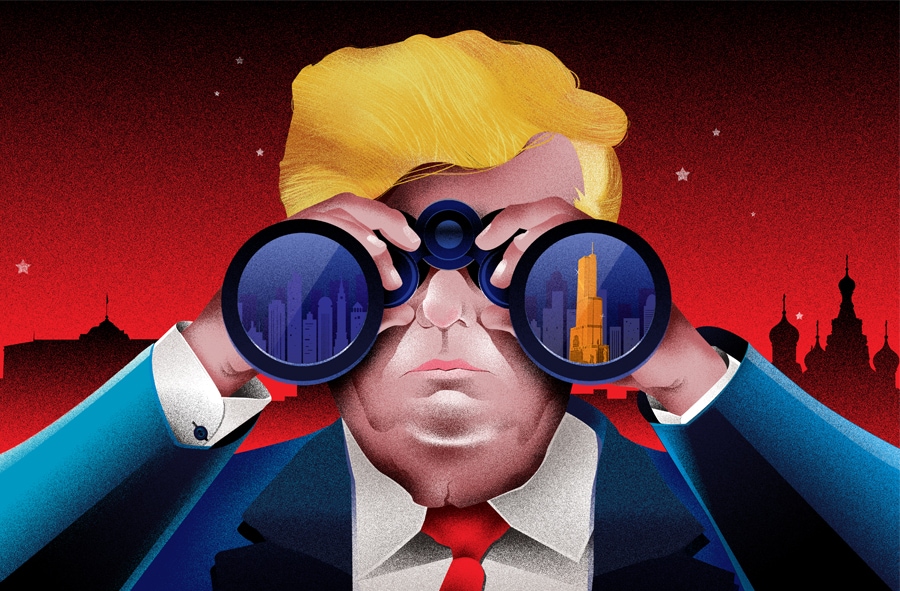 Illustration: Chaitanya Dinesh Surpur[br] It’s getting late, and Felix Sater—a onetime Trump partner, two-time convicted felon and longtime federal informant—sits in the back of a New York City restaurant, ready for a drink. “A very dirty martini, Russian vodka,” he tells the waiter. “A collusion martini.”
Illustration: Chaitanya Dinesh Surpur[br] It’s getting late, and Felix Sater—a onetime Trump partner, two-time convicted felon and longtime federal informant—sits in the back of a New York City restaurant, ready for a drink. “A very dirty martini, Russian vodka,” he tells the waiter. “A collusion martini.”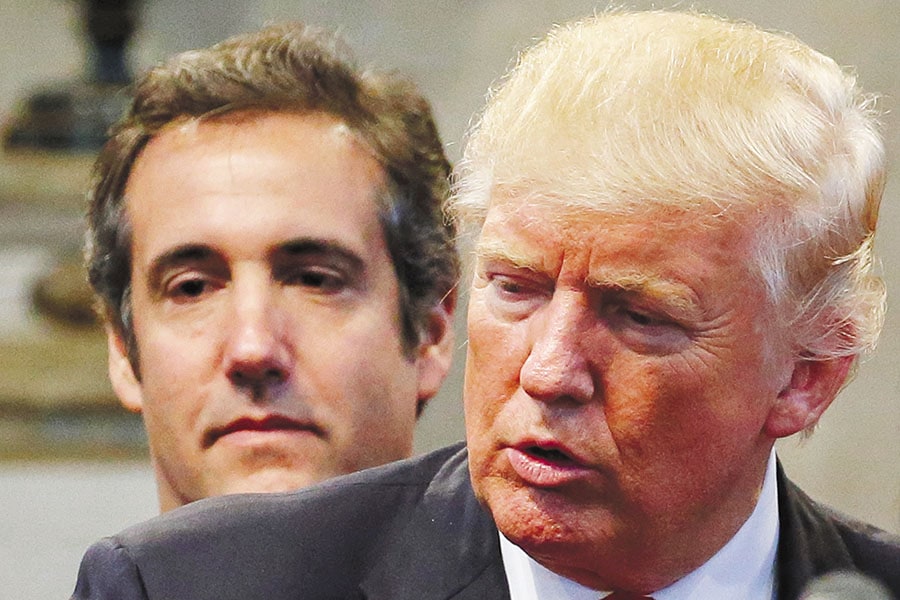 Trump with Michael Cohen: Three years ago, Cohen was working on a potential Trump tower in Moscow. Today he is in prison
Trump with Michael Cohen: Three years ago, Cohen was working on a potential Trump tower in Moscow. Today he is in prison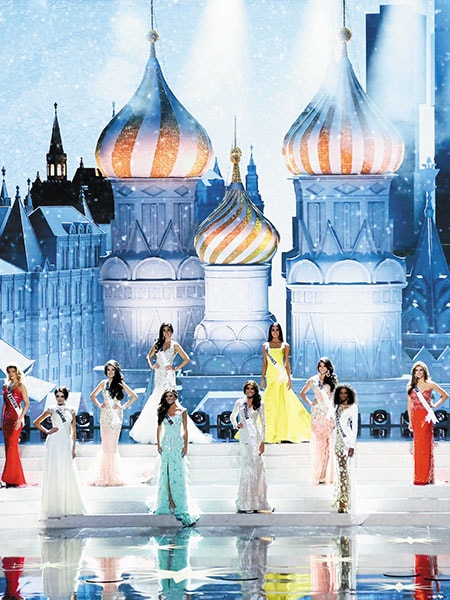 2013 Miss universe Pageant: Miss Venezuela took home the crown, but Donald Trump took home about $3 million
2013 Miss universe Pageant: Miss Venezuela took home the crown, but Donald Trump took home about $3 million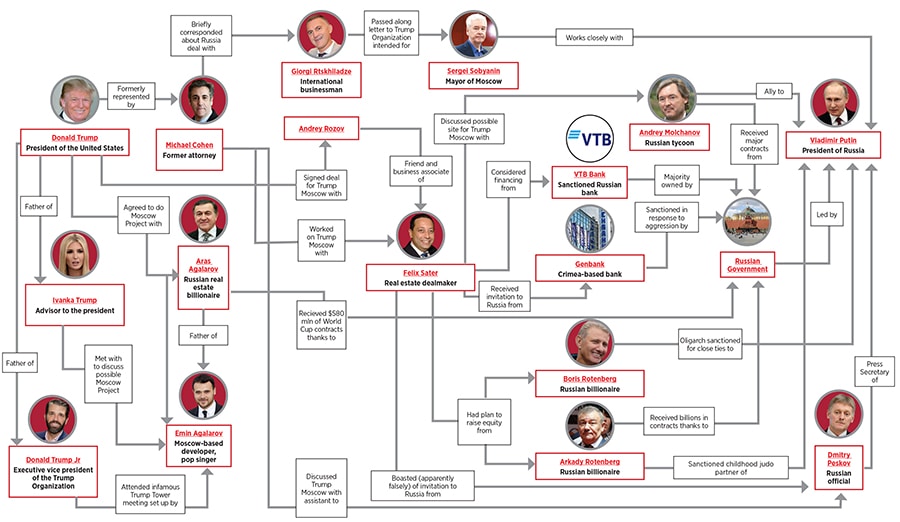 Who’s Who In Towergate
Who’s Who In Towergate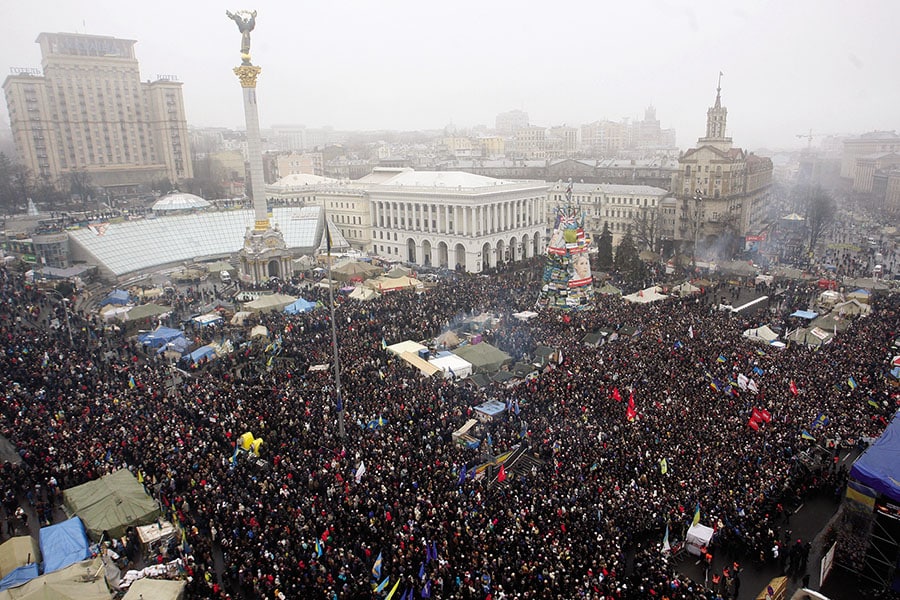 Kiev protests: Political turmoil in Ukraine preceded a Russian takeover of Crimea, which prompted US sanctions against Putin’s regime
Kiev protests: Political turmoil in Ukraine preceded a Russian takeover of Crimea, which prompted US sanctions against Putin’s regime